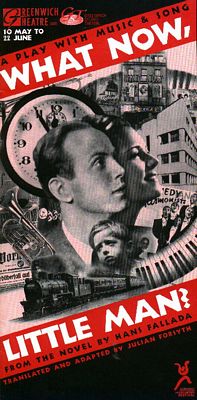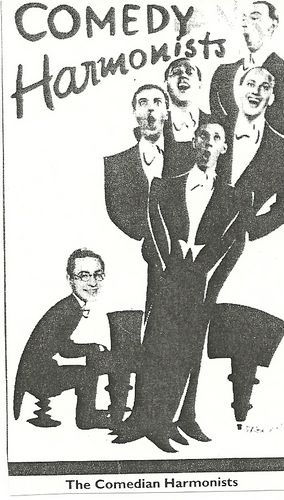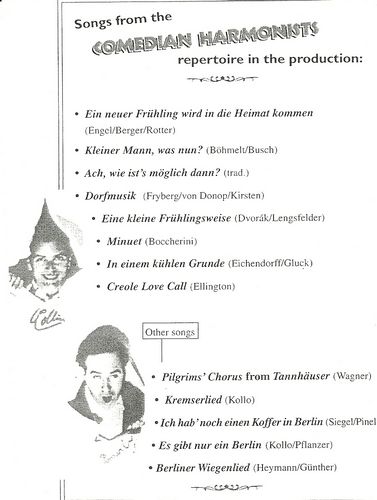WHAT NOW, LITTLE MAN? by
Hans Fallada
Adapted and translated by Julian Forsyth
Venue: Greenwich 1996
Directed by Margarete Forsyth
Adapted and translated by Julian Forsyth
Venue: Greenwich 1996
Directed by Margarete Forsyth

| PLATZ
and DUCHEROW |
|
| Johannes Pinneberg | Clive Walton |
| Emma Morschel | Sharon Small |
| Dr Sesame a gynaecologist | Walter Van Dyk |
| A Receptionist | Kristin Marks |
| Karl Morschel | Christopher Becks |
| Georg Morschel | Michael Neilson |
| A Cab-Driver | Henry Webster |
| Mr Bergmann a Jewish tailor | Philip Cox |
| Lauterbach a Nazi | Christopher Beck |
| Schulz a philanderer | Michael Neilson |
| Mr Kleinholz an employer | Henry Webster |
| Miss Kieinholz his daughter | Cheryl Ferguson |
| Mr Friedrichs a trades union official | Walter Van Dyk |
| BERLIN |
|
| Mia Pinneberg | Anita Dobson |
| A taxi-driver | Christopher Beck |
| A policeman | Michael Neilson |
| Jachmann Mia's lover | Henry Webster |
| Mr Lehmann head of Mandel's personnel | Christopher Beck |
| Heilbutt a salesman | Kristin Marks |
| Miss Semmler his secretary | Walter Van Dyk |
| Husband and Wife | Christopher Beck Kristin Marks |
| Cinema Usherette Ward Sister |
Cheryl Ferguson |
| Sister Klara |
Kristin Marks |
| Nothnagel man at swimming baths | Philip Cox |
| Franz Schluter an actor | Michael Neilson |
| Mr Spannfuss efficiency controller | Matthew Francis |


Much of the music in this production is drawn from the repertoire of the Comedian Harmonsists who in the period of the play were the most popular musical group in Germany. Between 1928 and 1935 the Comedian Harmonists toured ceaselessly and released numerous records; their concerts were invariably sell-outs and their reception was seldom less than rapturous. The critics were as enthusiastic as the audiences – “The best Jazz singers we have ever heard”, “the ultimate in Jazz singing” are typical comments – as was the musical establishment. The group came into existence at the beginning of 1928 through the efforts of Harry Frommermann, a young Berlin actor, who was taken with the sound of the Revellers, an American vocal group who sang Jazz in precise five-part harmony. Keen to try something similar, in December 1927 Frommermann placed an advert for singers in a Berlin newspaper:
|
ATTENTION!
RARE OPPORTUNITY! Eagerly seeking professional singers (not over the age of 25) - very musical, with beautiful sounding voices, for an outstanding new ensemble. |
Although the subsequent auditions were disappointing, they brought Frommermann into contact with Robert Biberti, who turned out to be just as enthusiastic about the Revellers, and between them they recruited further members from the Berlin music scene.The Comedian Harmonists’ sound was not easily created. While all were accomplished musicians, they were more accustomed to chorus work and small operatic parts, and the techniques required for five-part harmony, where no voice must overwhelm the others, took months of rehearsal. Some of the initial members of the group proved unsuitable, but by the summer of 1928, Frommermann had assembled the line-up which was to achieve international fame:
Ari Leschnikoff (1st tenor)
Erich Collin (2nd tenor)
Harry Frommermann (3rd tenor)
Roman Cycowski (baritone)
Robert Biberti (bass)
Erwin Bootz (piano)
Although the fledgling Comedian Harmonists took the Revellers’ vocal style as their starting point, they were keen not to be seen simply as imitators. Gradually they added to their repertoire songs from a wide variety of genres. They were eventually able to give concerts with material ranging from masterpieces of romantic composers to the most frivolous of contemporary pop-songs, along with folk songs and Jazz, not to mention purely instrumental pieces in which they imitated the instruments. And their performances were full of wit – not for nothing had impresario Eric Charell insisted they change their original “sensible” name Melody Makers to “something that combines comedy and harmony”. The combination of their tongue-in-cheek approach and their musical virtuosity made their music irresistible to the man in the street and the connoisseur alike.
At first just performing as one item among many in variety venues, by 1930 they were giving solo concert tours, with a repertoire that eventually included around 200 songs, over 150 of which were released on record. They also toured extensively outside Germany. But after five years of success came changes that were to lead to the break-up of the group. The author of its demise was Nazi bureaucracy in the shape of the Reichsmusikkammer (the Reich Chamber of Music), set up in the aftermath of Hitler’s seizure of power in January 1933. From March 1934 every practising musician had to be approved by the Reichsmusikkammer. With three Jewish members, the Comedian Harmonists knew they were under threat, but had some hope that their popularity would save them. But the pressure on the group led to acrimony, as the non-Jewish members were not prepared to forsake Germany for the uncertainties of exile, while the Jewish members seemed to have little choice.
After extensive correspondence, in February 1935 the Reichsmusikkammer finally came to a decision about the group. The three Jewish members (Frommermann, Cycowski and Collin) were banned from practising their profession, while the non-Jewish members were told, "You are free to pursue your musical activity with other Aryan musicians once you have taken on a German name instead of the name Comedian Harmonists". A few days later, on March 10 1935, Frommermann, Cycowski and Collin slipped out of Germany on the pretence of a concert in Vienna.
The Comedian Harmonists now became two groups. One, renamed the Meistersextett at the insistence of the Reichsmusikkammer, purged any non-German material from its repertoire, recruited three new members and continued performing until 1941. Initially merely criticised by the Nazi's for "unmanly" music, the group was finally banned altogether. The other group, again with three new members but keeping the name Comedian Harmonists, started out more or less penniless, not to mention stateless, but succeeded in building up a huge and enthusiastic following all over the world. But Cycowski left in 1941 and Frommermann was unable to keep the group going with its former success.
The reasons for their success between 1928 and 1935 were several. Firstly, there is their obvious accomplishment as performers - the precise synchronisation of their singing meant that every word could be understood, even in the largest concert halls. Also, as Frommermann had spotted, there was nothing like this in German music at the time, there was only stiff and formal "serious" music or pop or folk song. The breadth of their repertoire also enabled them to break down these divisions to some extent. And although they wrote little material themselves, Bootz and Frommermann showed great skill as arrangers, which meant that even well-known songs seemed fresh.
Although largely forgotten in the post-war years, the Comedian Harmonists are now recognised as a high point of the musical culture of Germany between the wars as a recent BBC Radio 4 programme showed, and their music is a suitable accompaniment to the story of the "little man" in the Berlin of the 1930's.
*
* * * *
Review
Review
This is a charming, revue-style adaptation by Julian Forsyth of Hans Fallada’s hit novel about a German white-collar worker. Clive Walton plays the decent ‘little man’ who does the right thing when his sweetly trusting girl (Sharon Small) gets pregnant. Twice losing his job but shrinking from his mother’s seamy lifestyle – portrayed with louche panache by Anita Dobson - they end up in a backyard shack, ironically hoping something will turn up in 1933. As a piece of jaunty reportage about the last days of the Weimar republic, with sideways glances at a Berlin bordello, the sun-loving naturist movement (featuring limber Walter Van Dyck and Kristin Marks) and the growing hatred of the Jews, the book was serialised, filmed twice, sold half a million copes world-wide and has just been republished in a new translation.
Despite the considerable pleasures of Margaret Forsyth’s musical staging with tuneful close-harmony songs in German, recreating the sounds of the Comedian Harmonists, it is hard now to see what all the fuss is about. Horvath documented the period more dramatically, Brecht was stronger on the politics, and, with the benefit of hindsight, Kander and Ebb have shown how Berlin cabaret foreshadowed the Third Reich. But this is an evening to celebrate the renaissance of the stylish if homeless Greenwich Studio Theatre company, surviving litigation and now at the start of a new collaboration with the Greenwich main house – indeed maestro Matthew Francis puts in a brisk cameo as the harsh voice of efficiency at Mandel’s department store, leading to our hero’s final downfall. And among the many delights are a cleverly deployed balcony setting by Emma Donovan, the German period feel of Beeke Roopers’ costumes and an enchanting musical ensemble.